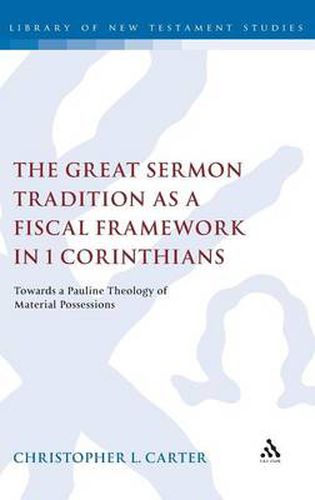The Great Sermon Tradition as a Fiscal Framework in 1 Corinthians: Towards a Pauline Theology of Material Possessions
Dr Christopher L. Carter

The Great Sermon Tradition as a Fiscal Framework in 1 Corinthians: Towards a Pauline Theology of Material Possessions
Dr Christopher L. Carter
This text addresses two separate but related questions. Firstly, what is Paul’s theology of material possessions, and secondly, what is the source of the apostle’s thought on this subject? Carter endeavours to answer these questions by posing the hypothesis that Paul owes his pecuniary thought to the synoptic sermon tradition. Unlike other studies that investigate this link, Carter does not appeal to verbal parallels to establish this theory. Rather, he demonstrates a continuity in the broad fiscal thought of Jesus and Paul. This is accomplished by first demonstrating the plausibility of Paul’s acquaintance with the dominical tradition through evidence related to the apostle’s historical environment and his extant writings.
The author then establishes the likelihood that Paul knew the pre-synoptic sermon tradition because of its ubiquity in early church discipleship, the judgment of form critical scholars, and its pervasive resonances in Pauline literature. From this point of embarkation, Carter moves on to articulate the broad fiscal thought of the synoptic sermons. It is found that the synoptic sermons’ fiscal material has a pervasively eschatological orientation, and that in the sermons, Jesus seeks to redefine the financial worldview of Christian disciples.
Having examined the synoptic sermons, their fiscal thought is compared with that expressed by Paul in 1 Corinthians. Through the course of this comparison, alternate sources in Jewish and Hellenistic literature are considered as potential explanations for any correspondences. Ultimately, the study concludes that Jesus’ and Paul’s financial thought evidence remarkable symmetry that cannot be explained by a shared cultural environment. Consequently, it is determined that Paul very likely depends on the dominical tradition for the contours of his financial thought.
This item is not currently in-stock. It can be ordered online and is expected to ship in approx 2 weeks
Our stock data is updated periodically, and availability may change throughout the day for in-demand items. Please call the relevant shop for the most current stock information. Prices are subject to change without notice.
Sign in or become a Readings Member to add this title to a wishlist.

